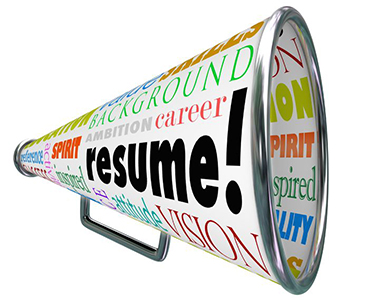 Oh the resume, that piece of paper you carried to the college career counselor, handed to prospective campus recruiters, and quickly filed away. Or did you toss it once you were hired? Why would you ever need another resume?
Oh the resume, that piece of paper you carried to the college career counselor, handed to prospective campus recruiters, and quickly filed away. Or did you toss it once you were hired? Why would you ever need another resume?
Think again. The phone rings, it’s a search firm with an inquiry. Suddenly you’re hearing about an intriguing position. “Can you shoot me over your resume?” the recruiter asks. An email from a colleague inviting you to speak on a panel. “Need your resume, no bio yet, just your resume, to show to the event coordinator.” Or, the day you have been dreading comes; your department is eliminated. Some colleagues suggest you give them a copy of your updated resume since, “I know a few people you might be interested in speaking with.”
In all cases you frantically try to piece something together and send it with an apology about, “I’m updating, working on it, tuning-it,” whatever, it’s a mess.
The lesson is everyone should have an updated resume on hand. Some of my coaching clients are rolling their eyes right now because I have been pushing them for (pick one—days, weeks, months, years).
Here is a simple resume retooling checklist to get you to a good enough professional resume, now.
- Check the contact data. Is it current? Do you have a personal email address that reflects you, the businessperson, not you as DougLovesDogs@hotmail.com. (Sorry Doug).
- Spend the most time writing your current position. Focus on accomplishments and outcomes. The more your can dollarize, numerate, or measure the better. Remember, this is not a job description, it’s a selling tool.
- Go through your former positions. Attempt to keep theme specific to the position you are looking to acquire. Most people ultimately have a few resumes, so customize. Entry-level positions receive brief or no mention unless it’s all you have.
- Education. This means degrees, institutes, and significant programs such as Harvard Leadership or AMA Management Seminars. GPA is required for newcomers, seems juvenile later on.
- Skills and fluencies. Beside the usual MS applications, do you know apps or programs specific to your industry? Fluency in foreign languages is an asset that should be mentioned.
Now you have the framework. Next are the most overlooked, and essential part of the resume—KEYWORDS. Making sure that the way you describe what you do is identical to how an electronic screener, a job researcher, and HR professional or decision maker describes the job. How do you find these words? Search for jobs on Monster.com, look for postings in industry associations, read bios on LinkedIn.com, and work with GoogleAds words. Collect and analyze your findings and place them throughout the resume. You must get the verbiage right in order to make the cut.
This is the starting point. If you are committed to the process, I guarantee you are ahead of the competition. Need I say this would give you The Competitive Edge?
Here’s Your Resume Challenge
Book time on your calendar to assess where you are with regard to your resume. Build the skeleton. Focus on your accomplishments and what you can do for the potential employer. Get those keywords and use them throughout. Consider adding a keyword competency line. Congratulate yourself for being ahead of your colleagues.
Leave a Reply